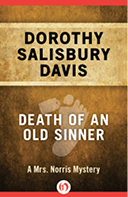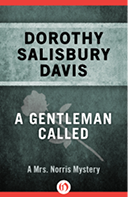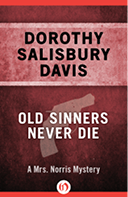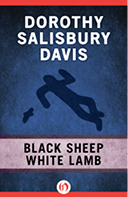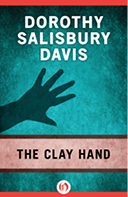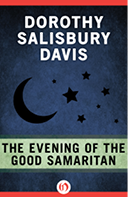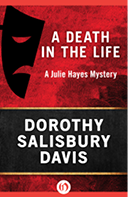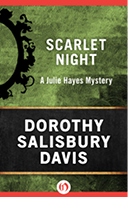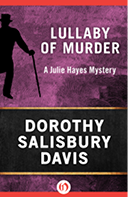God Speed the Night (27 page)
Read God Speed the Night Online
Authors: Dorothy Salisbury Davis,Jerome Ross

She did not answer.
“Do you know who it is the policeman wants?”
She did not answer.
“He will want us when we are gone. Otherwise, I would have left you with our friends. They were a kind of family. I think they’ll miss us. While I live I will remember them—and you, friend-sister.”
“Do not talk,” she said at last. “It is too painful.”
Before they docked at dawn in St. Pierre, the bargeman asked Marc where they wanted to go from there. Marc gave him the name of the mountain village where he was to find the guide René had promised.
“Come home with me,” the bargeman said, “there will be a coal truck going up if you don’t mind getting dirty. It has worked before.”
“And I’ve been dirty before,” Marc said, and to Gabrielle, lightly, “and you, madame, it will be like having spots. Remember when you said that to me?”
At last she smiled.
They were seated with the bargeman’s family for breakfast, brown bread and milk in bowls. Six children watched them eat while the oldest boy watched at the door. This was no new experience for any of them, Marc realized, even before the bargeman’s wife took him up a ladder to a loft where they were to hide if the signal was given. “It has never happened, monsieur, but that’s more reason to be careful.”
When the children had gone from the house and the woman to milk the cow, Marc and Gabrielle watched at the window alone. He remembered that other vigil from the mill. “Are you praying?”
“No.”
“Why not?” he said with tender teasing.
“I shall pray again,” she said, not looking at him.
“Who knows but I will too—some day.”
“Do you mean that, Monsieur Marc?” So briefly her eyes sought his.
“It is not a promise, and probably I won’t, but I will understand.”
“It is enough.”
“You’ve not said that for days, but then we have not talked for days. Or so it seems. Gabrielle…will you come with me?”
“Until you are safe.”
“I won’t ever be that safe.”
“I shall go back when there is time for you to have got across the mountain.”
And so she was resolved. He said, “Remember once you said that perhaps the Reverend Mother would not have you now?”
“She will! She will!” The tears welled up in her eyes.
“I said it then,” he went on quietly, “and I repeat it now: she would be the greatest fool not to, and I do not think that of her.”
“Thank you.”
“For what? Sending you back? I want to ask you a question, Gabrielle.”
“Please do not, Monsieur Marc.”
“I will ask it, but you do not need to tell me the answer. Do you want to come with me?”
“No.”
“You have not wanted to at all?”
“I did not permit myself to think about it.”
“Then you have not wanted it,” he said.
“That is probably so,” she said almost in a whisper.
“Then there is something I do not understand: why have you done so much for me? Why are you here with me now?”
“Because I believed you needed me.”
“And would you have done the same for any man, any creature on the run?”
She did not answer.
“Suppose the dwarf, Artur—no, better, suppose the policeman, Moissac—they call him the Jew—suppose he had been in my place?”
She felt the numbness coming over her again, the cold dead numbness. But that she could feel it again meant that it had gone away a little. “He would not have been in your place.”
“You are right,” Marc said after a moment. “He would not have been in my place. Forgive me, little sister, but I was searching for the truth for both of us. You see, one of the things you have given me: you have made me a person who wants to know, to understand. That is a great gift in times like these.”
“I am glad,” she said, and saying it, she knew it to be true. She could feel the gladness awakening in herself.
“One more question,” Marc said, “to which I have no right, but I shall ask it anyway. Do you feel that you have sinned in helping me?”
“No, Monsieur Marc, I do not believe that I have sinned.”
“You are not saying that to make it easier for me to go on?”
She shook her head. “And I am not saying it to make it easier for me to go back. I believe it to be so.”
He put his hand to where he might have touched hers. She did not draw away. Nor did he touch her, just letting his hand hover over hers. “I wish you great joy, Gabrielle.”
The novice bent her head until she touched his hand with her lips. Then, removing Rachel’s ring from her finger, she put it in his hand and folded his fingers over it. She turned away from him and Marc resumed his watching.
When the bargeman’s wife came in with the milk, Marc said: “Madame, would it be possible for my wife to stay here for two days? She is not Jewish, and I will not have her go with me just now.”
The woman looked sternly from one to the other of them and shook her head. It was, he suspected, her disapproval of mixed marriages. “You must speak to my husband,” she said.
When the bargeman came to say the coal truck would go within the hour, Marc spoke to him and arranged the price not only of Gabrielle’s staying there, but of her return by a series of barges to St. Hilaire. Gabrielle went up to the loft and stayed there until he was gone.
It was near nightfall of the third day afterwards that Gabrielle returned to St. Hilaire, but before anyone was allowed to leave the barge, the police came aboard to inspect the cargo. The pilot objected, and there was an argument which Gabrielle and two other passengers had to wait through. She stood, as the others, with identification in hand.
“It has never happened before,” the pilot said. “I will take it up with the prefect of police.”
“Do, monsieur, do. He will meet you in hell. He hung himself in his own jail three nights ago.”
She had to walk almost the length of Louis Pasteur, past the mill, and she had to wait while a German convoy passed. No, she thought, he will rest in peace if it is God’s will. I shall not say it, and when she reached the fork in the road leading up to Convent Hill, she began to run, and she did not stop running until her breath was gone, and when she had breath enough she ran the rest of the way.
Dorothy Salisbury Davis is a Grand Master of the Mystery Writers of America, and a recipient of lifetime achievement awards from Bouchercon and Malice Domestic. The author of seventeen crime novels, including the Mrs. Norris Series and the Julie Hayes Series; three historical novels; and numerous short stories; she has served as president of the Mystery Writers of America and is a founder of Sisters in Crime.
Born in Chicago in 1916, she grew up on farms in Wisconsin and Illinois and graduated from college into the Great Depression. She found employment as a magic-show promoter, which took her to small towns all over the country, and subsequently worked on the WPA Writers Project in advertising and industrial relations. During World War II, she directed the benefits program of a major meatpacking company for its more than eighty thousand employees in military service. She was married for forty-seven years to the late Harry Davis, an actor, with whom she traveled abroad extensively. She currently lives in Palisades, New York.
All rights reserved, including without limitation the right to reproduce this ebook or any portion thereof in any form or by any means, whether electronic or mechanical, now known or hereinafter invented, without the express written permission of the publisher.
This is a work of fiction. Names, characters, places, events, and incidents either are the product of the author’s imagination or are used fictitiously. Any resemblance to actual persons, living or dead, businesses, companies, events, or locales is entirely coincidental.
Copyright © 1968 by Dorothy Salisbury Davis and Jerome Ross
Cover design by Tracey Dunham
978-1-4804-6131-4
This edition published in 2014 by Open Road Integrated Media, Inc.
345 Hudson Street
New York, NY 10014

